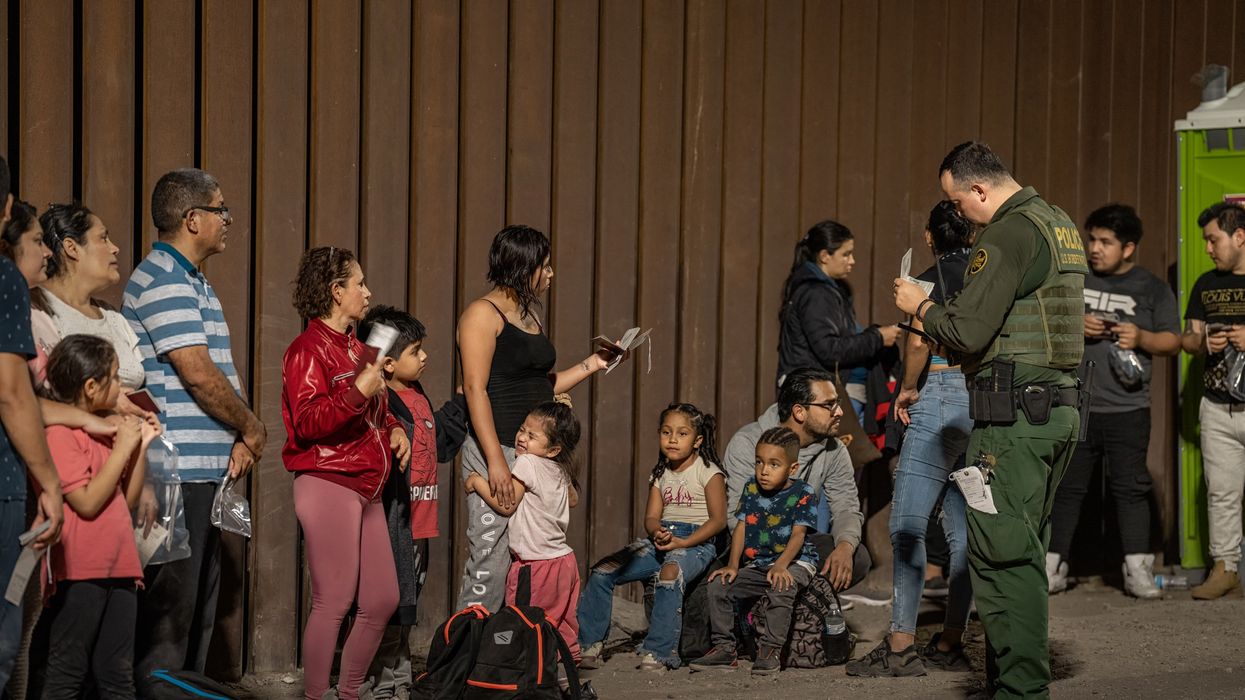Hill was policy director for the Center for Humane Technology, co-founder of FairVote and political reform director at New America.
The last comprehensive immigration reform was enacted almost four decades ago, when Ronald Reagan was president. So many Americans were pleased when a bipartisan group of senators announced they had agreed on a compromise bill that would provide for both a more secure and more humane border. It seemed like a win-win.
But then former President Donald Trump worked behind the scenes to kill the legislation because he did not want to give a political victory to President Joe Biden. It’s not the first time that sensible immigration policy got strangled by partisan gamesmanship. Such congressional battles make it harder for the public to know what good policy even looks like.
Unfortunately many important economic questions related to immigration rarely get discussed. How does immigration actually impact our economy and nation? What are the pros and cons of having large numbers of newcomers crossing our border? After all, we are a nation of immigrants. If it wasn’t for immigration, most of us wouldn’t be here. Or, is it different this time?
Here’s the key thing to know about immigration: The reason it’s so controversial is because how it affects you greatly depends on who you are.
Are you a business owner who needs to hire lots of blue-collar workers? If so, then immigrants from south of the border are a blessing, because they make it possible for you to employ cheaper labor. That could well be why a number of Republican business leaders in places like Texas, Arizona and California did not support Trump’s anti-immigration policies.
Are you a blue-collar worker? Then you might perceive that “hordes” of immigrants who are willing to work cheaply are threats to steal your job.
Or maybe you’re a parent with schoolchildren who has recently seen a rise in immigrant kids. Then you may worry about your taxes having to pay for a surge in teacher hiring, translation services and more.
Are you worried about escalating prices on your grocery bill? Then you might welcome more workers from across the border who will pick your food for lower wages. Most Americans aren’t willing to work at hard labor jobs like that.
Or perhaps you are an economist, worried about a declining population, worker shortages, dependency ratios and falling labor productivity. If so, then you probably welcome a certain number of new workers, especially skilled labor that can make businesses more productive.
Are you the CEO of a tech company? Then you favor the H1-B visa laws that allow migrants from places like India and China to fill jobs for computer programmers and software designers. Those imported workers come cheaper than Americans yet have top-notch skills for creating great products, like your smartphone and apps.
Or maybe you are a politician, looking to get reelected? Then you might be tempted to bash immigrants and attack political opponents as “soft on immigration” as a way to score points with voters.
The point is, what you believe about immigration is very dependent on where you sit. Many people fit in two or more of the boxes mentioned above, making matters complicated and personal. Consequently, the economic impacts of immigration often are colored by larger cultural and political concerns.
What do economic studies say?
Study after study clearly shows that large increases in immigration have a tendency to lower wages in the mostly blue-collar jobs where those immigrants work. But – the effect usually is temporary, according to the National Academies of Sciences, Engineering, and Medicine.
Over the longer term, new workers provide employers with opportunities to expand their businesses, increase production and add jobs to service new customers. Immigration actually “ grows the economic pie ” over time, and most of the negative wage or employment impacts fade away. Moreover, according to the Brookings Institution, immigrants usually work different jobs than native-born workers, which often results in lower prices for widely enjoyed services like child care, food preparation, house cleaning and construction.
Here are some other things about immigration that many people don’t know:
- Immigrants accounted for a high share of essential front-line workers during the pandemic, according to the congressional Joint Economic Committee. They placed themselves at great risk for contracting Covid-19, with some doing dangerous jobs like working at meatpacking plants during a challenging time for the nation.
- Immigrants play an increasingly important role filling a jobs gap in the health care industry. Nearly 2.8 million immigrants were health care workers in 2021, accounting for more than 18 percent of that industry’s workforce. Millions of them fill critical roles for physicians and surgeons (26 percent), registered nurses, dentists, pharmacists, dental hygienists and home health aides (almost 40 percent). Nearly half of new immigrants have college degrees.
- Over time, immigrants pay more in taxes than they receive in services. First-generation immigrants are more costly than native-born Americans, mainly at the state and local levels, mostly due to the costs of educating their children. But that investment shows extremely favorable returns. Many children of immigrants (the second generation) go on to achieve higher education and elevated incomes, eventually contributing more in taxes than native born Americans. Across the generations, immigrants provide a favorable net return.
- Areas with higher rates of immigration are more likely to appreciate the benefits of immigration and tolerate cultural differences, while those communities where the rate of immigration is lowest have the strongest antagonism toward immigrants.
Immigration will always be a challenge for a modern democratic society. A country can only absorb so many newcomers so fast, it’s not easy to fully integrate new arrivals. These are all major factors in determining whether the pluses outweigh the minuses. Given the complexity of the issue, what is needed from our leaders is not simplistic divisive rhetoric but a pragmatic approach that carefully weighs all factors.




















Trump & Hegseth gave Mark Kelly a huge 2028 gift